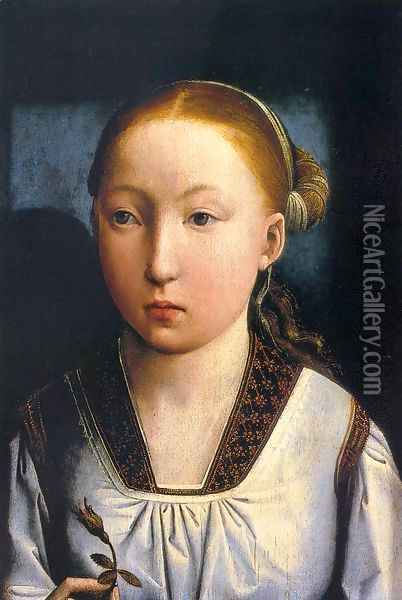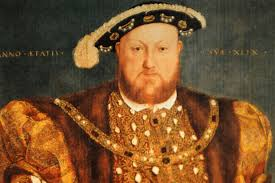Okay
What am I going to do with you Anne ? So many many people wish to vilify you, in order to understand and ultimately justify what was most certainly a political assassination because your husband Numbwit (a.k.a. Henry VIII) couldn't sire a son on you. Yet why, is there such dissent when considering both your character and your actual role in the events that unfolded circa 1536?
Unfortunately, there is very little concrete knowledge about Anne's early years. We know that she was one of three, possibly four children of Thomas Bolelyn, a minor noble in Henry's court. But, although his rank was not notable, his ambition was. As his children grew, he began to use them as pawns in his game to achieve a degree of power undreamed of for a man of his rank. It's a little disturbing, that when his gambit reached the end, he had all but lost not only his power, and two of his most talented children.
So, what is the story here? Well, there is not a lot that we know about Anne Bolelyn's early childhood and life. We know that she and her siblings had a relatively carefree childhood at Hever Castle, in Kent. We know that her sister Mary and then she were both sent for a time to the French court, in an effort to complete their education--probably as young up-and-coming noblewomen. While Mary (about which we know very little) appears to not have been deeply affected by this education, Anne was--by the end of her tenure she reportedly spoke several languages (including french), and could read (and did) in Latin and French in addition to English. As for Mary, she does not appear to have been as accomplished as her sister, and was quickly married off to a minor courtier in Henry's court when she returned home.
Shortly after Mary's marriage, so the story goes, she was seen by Henry (either at court, or at her family's estate). And what Henry saw, Henry got--women especially. And so, Mary became Henry's lover, albeit briefly. It is quite possible, that as a result of this liaison, Mary gave birth to a son, which was probably sired by the King. However, we'll never know. What we do know is that Henry's lust for Mary began to wane, and it was about this time that Anne returned to England, freshly burnished by the French court. Quickly, Anne distinguished herself as a sophisticated woman of impeccable taste and fashion. She even reportedly spoke English with a slight accent! When Henry's eye finally alighted on Anne, it was all over--Henry now had an object to not only desire physically, but to lust after, mentally speaking.
It's a matter of record, that this infatuation quickly turned into something more substantial--here was an intelligent, attractive young woman who was relatively available. A woman who refused to give up what apparently her sister had given so easily--her virtue. It's a tribute to Anne's ingenuity, that she was able to seduce the King, and then to lead him on a merry dance that lasted more than seven years.
Seven years! I mean, what in the hell was his lawful wife Catherine of Aragon thinking? That this was just another fling (like Bessie Blount), to be discarded, and forgotten? If so, then she was badly mistaken. It was so hard being her in those years--here was a gallant woman who had had the king's heart in the early years of their marriage, but Henry's ardor quickly faded as the years passed, and Catherine still had not produced a single son who lived. Catherine apparently had no difficulty in getting pregnant--it was just that the babes either died in the womb, or could not survive in the difficult environment that was London in the 1520s. Whatever the reason, by the time Anne came into the picture, Catherine was well into her post childbearing years, and the King's regard for her had dwindled sexually. He apparently did not regard her as a sexual being any longer.
It seems as though by the time of Anne, Henry and Catherine were rather like brother and sister, than husband and wife. This marriage that had begun so happily, and with such hope, had become a shell. Also, the only child to survive between the two was a girl, Mary. Henry was appalled. He became determined that GOD According to Leviticus (i.e. if you marry your brother's wife, then it is an unclean act, and your children shall be brought into this world dead, yada yada yada). I guess Mary didn't count. Indeed in Henry's eyes, she did not, because she was a SHE. Misogynist bastard that he was.
With Catherine, well into her forties, and Henry desperate for a son, he began to see only one way ahead--to rid himself of his current wife, and marry a much younger womb. In addition, somewhere along the way, Henry began to acquire an pseudo-intellectual basis for a reconstruction of the nature of his kingly power. It is possible that began this journey when introduced to European texts that were popular among the emerging protestant scholars, such as William Tyndale. His work, "Obedience of a Christian Man" spoke, among other things, about the need for a christian ruler to be responsible for the religious and moral welfare of his subjects. While this is a loose interpretation of the book, and there were certainly more complex ideas contained therein, Henry took the idea of absolute religious responsibility, and probably said to himself 'yessir!' I like to think of Henry and this religious/social commentary as a pair of lovers, running together in slow motion over a field of red poppies, and then falling to the ground to engage in some hot sex.
I also have a feeling that Henry was exposed to other ideas of earlier scholars who considered the nature of princely power, like Nicolo Machiavelli. My point is this--that ideas which would give a king absolute power over both the physical and spiritual well being of his subjects were already well established within the intelligentsia of Europe. Henry merely took these ideas and ran with them, all the way to the bank, and then over six women, two of whom did not survive the experience of marriage to the bastard.
To review, right now we are discussing wives one and two, Catherine and Anne. I do not think that it is appropriate to discuss these poor women (who had the misfortune to marry Henry and share however briefly his throne), without seeing their faces:
Catherine of Aragon, as a young woman:
This is an actress named Jodie Turner Smith, who is the most recent in a long line of actresses to play Anne Bolelyn Frankly, I cannot wait to see her interpretation!
and then as an older king, a few years before his death, we get this fat bastard (and no i am not talking about the Austin Powers' character).
So, what happened to Anne? Well, it is said that she miscarried twice, and the last time was a deformed boy. It is also said that Henry took this to be signs that Anne was in fact a witch. However, this tale might be just that--myth created after Anne's death to justify the actions of the king. The truth probably lay in the fact that their relationship was tumultuous, and Anne was not exactly a doormat. Whatever the reason, Anne was under scrutiny, by Henry, and by his minion Thomas Cromwell.
Thomas would be responsible for procuring what the King wanted in many situations--and in this one, it was Jane Seymour, a rather demure, pretty young thing from Wolf Hall. Certainly the Seymours were eager little beavers to effect Thomas' downfall, and to oust the Bolelyn's hold over the king. Chiefly, they worked ceaselessly to rid England of Anne--or the "black crow" as she was known. Personally, I prefer this nickname, over the other more infamous one "the great whore." Blame the woman, every time. Jesus.
In the end, Cromwell was asked by Henry to find evidence of Anne's adultery, largely due to court gossip, and a vindictive Lady-in-Waiting to the Queen, Lady Rochford, the wife of Anne's brother George. Cromwell was able to manufacture charges of High Treason against the erstwhile Queen, and five of the King's courtiers, including Anne's brother. Adultery, incest, and witchcraft for God's sake. Wow.
In the end all were found guilty, summarily tortured, and executed. 11 days later, or thereabouts, Henry married his third wife, Jane, with whom he was reportedly happy, except when she died due to complications of childbirth. But at least Henry had his damned son. Or should I say Sun?
Poor Anne has subsequently been either lauded or vilified by historians. As for me? I land myself firmly in Camp Anne. Henry was a bastard.
:max_bytes(150000):strip_icc()/Anne-Boleyn-Holbein-520723985x-56aa265f5f9b58b7d000fe2f.jpg)







Comments
Post a Comment